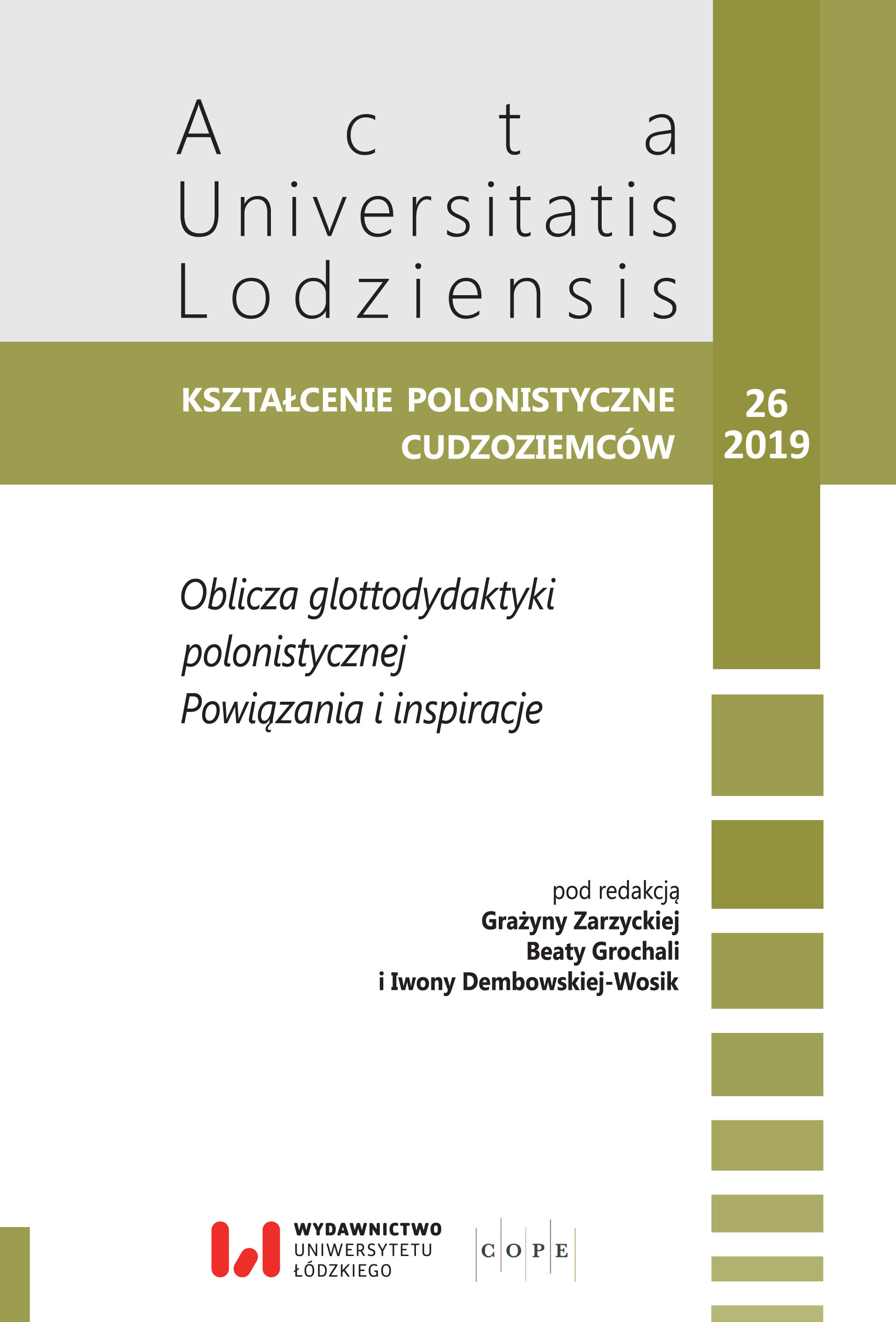Czy rosyjski jest bardziej „angielski” niż polski? O zapożyczeniach w języku informatycznym w aspekcie glottodydaktycznym
DOI:
https://doi.org/10.18778/0860-6587.26.27Słowa kluczowe:
język specjalistyczny, zapożyczenia, język informatycznyAbstrakt
Dzięki powszechnej globalizacji specjaliści z różnych dziedzin, zwłaszcza wysoko wykwalifikowani, mogą bez problemu znaleźć zatrudnienie poza granicami swojego kraju. Polska znajduje się wśród państw, których rynek pracy jest coraz bardziej atrakcyjny dla wielu cudzoziemców. Dotyczy to także branży IT, od lat przyciągającej specjalistów z krajów byłego Związku Radzieckiego. Interesujące jest zatem – wydaje się – porównanie wpływu języka angielskiego, będącego podstawą języka specjalistycznego tej branży, na język polski i rosyjski. W artykule autorka podejmuje próbę odpowiedzi na pytanie, czy anglicyzmy występujące w polskim i rosyjskim języku informatycznym są takie same. Pragnie także pokazać stopień przyswojenia przykładowych zapożyczeń w obu omawianych językach i omówić wynikające z tych obserwacji implikacje dla glottodydaktyki polonistycznej.
Bibliografia
Dunin-Dudkowska A., 2013, Zapożyczenia angielskie w polszczyźnie 70-lecia, w: A. Dunin-Dudkowska, A. Małyska (red.), 70 lat polszczyzny. Zjawiska, procesy, tendencje, Lublin, s. 191–204.
Google Scholar
Erova S. N., 2007, Istorija zaimstvovanij slov v russkom jazyke, w: Učenye zapiski, vyp. 2(51), Hudžand, s. 155–160.
Google Scholar
Komorowska H., 2003, Metodyka nauczania języków obcych, Warszawa.
Google Scholar
Krajka J., 2016, Czy korpus prawdę Ci powie? O wykorzystaniu korpusów w nauczaniu języka do celów zawodowych, „Języki Obce w Szkole”, nr 3, s. 34–38.
Google Scholar
Krysin L. P., 1996, Inojazyčnye slova v sovremennoj žizni, Moskva.
Google Scholar
Krysin L. P., 2004, Russkoe slovo, svoe i čužoe: Issledovanija po sovremennomu russkomu jazyku i sociolingvistike, Moskva.
Google Scholar
Luciński K., 2000, Anglicyzmy w języku polskim i rosyjskim, Kielce.
Google Scholar
Mańczak-Wohlfeld E., 2006, Angielsko-polskie kontakty językowe, Kraków.
Google Scholar
Nowy słownik poprawnej polszczyzny PWN, 1999, A. Markowski (red.), Warszawa.
Google Scholar
Seretny A., Lipińska E., 2005, ABC metodyki nauczania języka polskiego jako obcego, Kraków.
Google Scholar
Słownik informatyczny angielsko-polski, 1991, A. Marciniak., M. Jankowski (red.), Warszawa–Poznań.
Google Scholar
Šanskij N. M., 2009, Leksikologija sovremennogo russkogo jazyka, Moskva.
Google Scholar
Walczak B., 1987, Między snobizmem i modą, a potrzebami języka, czyli o wyrazach obcego pochodzenia w polszczyźnie, Poznań.
Google Scholar
Witaszek-Samborska M., 1992, Wyrazy obcego pochodzenia we współczesnej polszczyźnie, Poznań. Analizy i raporty / Cudzoziemcy pracujący w Polsce – statystyki,
Google Scholar
https://www.mpips.gov.pl/analizy-i-raporty/cudzoziemcy-pracujacy-w-polsce-statystyki [4.04.2018].
Google Scholar
https://www.bankier.pl/wiadomosc/Cudzoziemcy-w-Polsce-przybywa-informatykow-medykow-i-specjalistow [4.04.2018].
Google Scholar
https://www.rp.pl/artykul/1122154-Brakuje-informatykow--Deficyt-siega-50-tys-specjalistow [4.04.2018].
Google Scholar
https://www.computerworld.pl/slownik [1.04.2018]
Google Scholar
https://greenforest.com.ua/journal/read/osoblivosti-anglijskoi-u-galuzi-it [2.04.2018]
Google Scholar
Pobrania
Opublikowane
Jak cytować
Numer
Dział
Licencja

Utwór dostępny jest na licencji Creative Commons Uznanie autorstwa – Użycie niekomercyjne – Bez utworów zależnych 4.0 Międzynarodowe.










